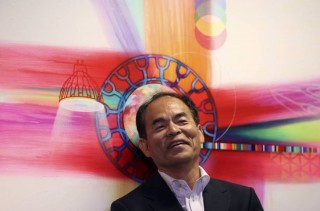Loading
Search
▼ Nobel laureate says Japan’s business culture stifles innovation
- Category:Other

JAPANTIMES
One of the three co-laureates of this year’s Nobel Prize in physics said he fled Japan for the United States because of the stifling environment for entrepreneurs in his native country.
Speaking in Santa Barbara, California on Tuesday, 60-year-old materials scientist Shuji Nakamura said what had encouraged him in his work was “anger.”
The professor at the College of Engineering at the University of California, Santa Barbara, cited two protracted legal disputes with his former employer, Tokushima Prefecture-based Nichia Chemicals.
“Everyone has a chance to dream (the) American dream. Everyone has a chance if you work very hard,” he said in English at a news conference.
The same is not true in Japan, he added, especially when it comes to business innovation.
Nakamura also said Japanese companies’ failure to internationalize themselves is why they have lost so heavily to foreign competitors in fields such as mobile phones, televisions, semiconductors and solar panels, even though they were once known for manufacturing high-quality products.
“It is the main reason why American and Chinese products took over these markets,” he said later, in an interview.
“If Japanese companies don’t reform drastically and implement English as their daily business language, the economy will only continue to contract,” he said.
It was while working for Nichia that Nakamura developed the blue light-emitting diode — a feat which the Nobel Committee honored him for, along with two others. But Nichia filed a patent for the technology in 1990, the year of Nakamura’s discovery.
Commercialization of the technology in 1993 brought the company eye-watering profits, but it initially gave Nakamura only ¥20,000 for his discovery.
He quit in 1999 and in August 2001 filed a groundbreaking lawsuit with Tokyo District Court against Nichia, pursuing his patent rights. The court ordered Nichia to pay ¥20 billion — although the judge said Nakamura was probably entitled to three times that amount. He said Nakamura was entitled to 50 percent of the patent earnings, which the judge said had totaled ¥120.8 billion.
The lawsuit threw a spotlight on the question of how to reward innovation.
Although the Tokyo District Court’s decision got the headlines, it was Nichia’s appeal to the Tokyo High Court that secured a settlement. It, however, reduced the ¥60.4 billion demand to ¥600 million, and in January 2005 Nakamura received a settlement of ¥840 million — the mandated sum plus late payment charges.
The unprecedented lawsuit encouraged other inventors to seek reward for their discoveries in court. Many of them won the suits or received a settlement.
Although Nakamura left Nichia on bad terms, he said Nobuo Ogawa, the company’s founder and chairman “is the person I respect the most.”
Meanwhile, co-laureate Hiroshi Amano, 54, a professor at Nagoya University, told reporters in Grenoble, France, he was happy the LED discovery will have a practical impact on people’s lives.
“If you believe (in what you’re doing), the only thing you need is just try not to give up,” he told reporters, with a lightness that betrayed little of the hardship he had endured in his years of research.
“Although at times I felt discouraged by failures along the way, they helped me generate new ideas every time I woke up the next morning,” he said. “Every day during my youth looked like that.”
The third laureate is Isamu Akasaki, 85, a distinguished professor at the Nagoya University and a professor at Nagoya’s Meijo University. Speaking in Nagoya, Aichi Prefecture, he expressed surprise at receiving what he called the world’s “most prestigious prize.”
At a press conference on Tuesday evening, Akasaki said the prevailing opinion had been that nobody would develop a blue LED, because it represented “the most unachievable challenge of the 20th century.”
He added that many other scientists had abandoned their efforts to create it.
“I wasn’t considering whether we would succeed or win” he said. “I was just doing what I believed in.”
- November 4, 2014
- Comment (0)
- Trackback(0)

